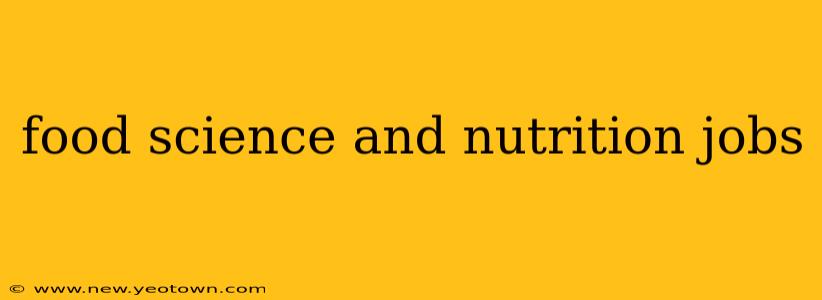A Delicious Career Path: Exploring the World of Food Science and Nutrition Jobs
The aroma of freshly baked bread, the vibrant colors of a perfectly ripe tomato, the satisfying crunch of a crisp apple – these are just a few of the things that make food so captivating. But behind the sensory delights lies a fascinating world of science and nutrition, offering a diverse range of rewarding career paths. This isn't just about cooking; it's about understanding the intricate science behind food production, its impact on our health, and the future of our food systems. Let's explore some of the exciting opportunities in this dynamic field.
What are the different types of jobs in food science and nutrition?
This is a broad field, encompassing everything from the molecular structure of food to its impact on public health. Job roles vary widely, catering to different interests and skill sets. Some popular career paths include:
-
Food Scientist: These professionals are the masterminds behind food development, ensuring quality, safety, and stability. They work on everything from optimizing production processes to innovating new food products. Imagine being the driving force behind the next "superfood" or a revolutionary new food preservation technique.
-
Registered Dietitian/Nutritionist: These experts are the guardians of our health, providing guidance on nutrition and dietary needs. They work in hospitals, clinics, schools, and private practices, educating individuals and communities on healthy eating habits. They help individuals manage diseases through diet and empower them to make informed food choices.
-
Food Technologist: Bridging the gap between science and production, food technologists apply scientific principles to food processing and manufacturing. They oversee quality control, ensure compliance with regulations, and optimize efficiency throughout the production chain. They're the behind-the-scenes heroes making sure our food is safe and delicious.
-
Culinary Scientist: A rapidly growing field, culinary science blends the art of cooking with the principles of food science. These professionals focus on the chemical and physical transformations that occur during cooking, creating innovative recipes and improving existing techniques. Think of them as the culinary innovators pushing the boundaries of gastronomy.
-
Research Scientist: For those with a passion for discovery, a career in food science research offers unparalleled opportunities. These scientists conduct experiments, analyze data, and publish findings that shape our understanding of nutrition and food technology. Their work has the potential to impact global food security and public health.
What kind of education is needed for food science and nutrition jobs?
The educational requirements vary depending on the specific role. Many entry-level positions require a bachelor's degree in food science, nutrition, dietetics, or a related field. However, advanced roles, such as research scientists or senior food technologists, often require a master's or doctoral degree. Specialized certifications, such as becoming a Registered Dietitian (RD) or Registered Dietitian Nutritionist (RDN), can enhance career prospects and open up new opportunities.
What is the job outlook for food science and nutrition jobs?
The job outlook for food science and nutrition professionals is generally positive. The increasing global population, growing demand for convenient and healthy food products, and heightened awareness of the link between diet and health are driving growth in this field. This means a promising future for those who are passionate about food and its impact on our lives.
What skills are needed for food science and nutrition jobs?
Success in this field requires a blend of hard and soft skills. Strong analytical and problem-solving skills are crucial, as is a deep understanding of food chemistry, microbiology, and nutrition. Excellent communication skills are also vital, as you'll be interacting with colleagues, clients, and the public. The ability to work independently and as part of a team, as well as adaptability and a passion for continuous learning, are also highly valuable.
Are there food science and nutrition jobs for entry-level candidates?
Yes, absolutely! Many entry-level positions exist in quality control, food production, and laboratory settings. Internships and co-op programs offer valuable experience and can lead to full-time employment.
How can I find food science and nutrition jobs?
Networking is key! Attend industry conferences, join professional organizations, and connect with professionals on LinkedIn. Online job boards, university career services, and company websites are also excellent resources for finding open positions. Tailoring your resume and cover letter to highlight relevant skills and experience is crucial for landing your dream job in this exciting and fulfilling field.
The world of food science and nutrition is a dynamic and rewarding one, offering a diverse range of career paths that combine scientific rigor with a passion for food. Whether you're fascinated by the chemistry of cooking or driven to improve public health, this field has something to offer everyone with a passion for food and its impact on our world.

